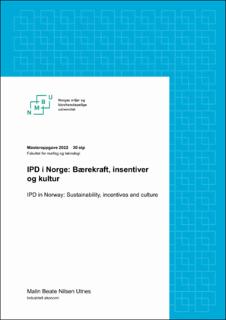| dc.contributor.advisor | Gabrielle Bergh | |
| dc.contributor.author | Utnes, Malin Beate Nilsen | |
| dc.date.accessioned | 2023-05-04T16:27:32Z | |
| dc.date.available | 2023-05-04T16:27:32Z | |
| dc.date.issued | 2022 | |
| dc.identifier | no.nmbu:wiseflow:6726280:52486866 | |
| dc.identifier.uri | https://hdl.handle.net/11250/3066249 | |
| dc.description.abstract | Norge står ovenfor en forpliktelse om å halvere klimagassutslippene innen 2030, og har forpliktet seg til internasjonale avtaler som FNs bærekraftsmål og Parisavtalen. Globalt står dagens bygg- og anleggsbransje står for 40% av klimagassutslippene, og endringer må gjøres for å oppfylle våre forpliktelser. Mangel på tverrfaglig samarbeid hevdes å være er en av årsakene til at norske byggeprosjekter ikke bygges bærekraftig nok. Integrated Project Delivery (IPD) er en kontraktsmodell som fremmer tverrfaglig samarbeid og øker verdien av prosjektets gevinster, gjennom tidlig involvering av nøkkelaktører og insentiver som samsvarer med optimalisering av prosjektet. IPD er en anerkjent gjennomføringsmodell i andre land som USA, men Tønsbergprosjektet er det eneste byggeprosjektet i Norge som per dags dato har benyttet IPD som kontraktsmodell.
Hensikten med oppgaven er å studere på hvordan IPD-modellen i et norsk byggeprosjekt påvirker bærekraftsmålene og bærekraftsperspektivet i prosjektet. Både insentiver og kultur er viktige elementer i IPD, og derfor er forskningsspørsmålene knyttet til både insentivene og kulturen. Forskningsspørsmålene ble besvart gjennom å benytte metode- og datatriangulering bestående av litteraturstudie, og en casestudie, bestående av dokumentanalyse og intervjuer. For å øke forståelsen for IPD som kontraktsmodell ble det først gjennomgått litteraturstudier fra andre land, og hovedsakelig USA. Gjennom elleve kvalitative intervjuer fra henholdsvis byggherre, rådgiver og entreprenør i Tønsbergprosjektet, har masteroppgaven belyst insentivene og oppnåelse av bærekraft i IPD-modellen for alle parter.
Litteraturstudien viser dersom det finnes krav om å ivareta bærekraftsmålene igjennom kontrakten, så kan IPD være en kontraktsmodell å foretrekke. Funnene fra masteroppgaven viser at det ikke finnes direkte insentiver for å ivareta et bærekraftsperspektiv i den norske IPD-kontrakten utover kravene. Det diskuteres også hvorvidt den delte profitten kan virke som et perverst insentiv ved en stram kostnadsramme for prosjektet. Videre forteller oppgaven om viktigheten av kultur, og oppnåelse av kulturen. Til slutt tar oppgaven for seg hvordan kulturen kan påvirke bærekraften i et IPD-prosjekt. I arbeidet med masteroppgaven ble det også avdekket områder som kan være interessant å belyse gjennom videre arbeid.
Nøkkelord: Integrated Project Delivery / IPD i Norge / Bærekraft / Insentiver / Kultur | |
| dc.description.abstract | Through the Paris agreement, Norway is obligated to half its greenhouse gas emissions by 2030 and is also committed to the UN sustainable development goals. Globally the construction industry stands for 40% of all greenhouse gas emissions, and changes in the industry is necessary to fulfill our obligations. Lack of interdisciplinary collaboration is claimed to be one of the reasons why Norwegian construction projects are not sustainable enough. Integrated Project Delivery (IPD) is a delivery model that is intended to increase interdisciplinary collaboration and the value of the project, by early involvement of key participants and using incentives that match the optimization of the project. Although IPD is a well-known delivery model in other countries, the Tønsberg project is currently the only construction project in Norway that has used an IPD-model.
The purpose with this master´s thesis is to study how the IPD-model in a Norwegian construction project affects the sustainability goals and the sustainability perspective in a project. Both incentives and culture are significantly in IPD, and therefore the research questions are linked to both incentives and culture. The research questions have been answered through mixed methods and data triangulation consisting of a literature study, and a case study consisting of a document study and interviews. First literature from other countries was studied to increase the understanding of IPD. Through eleven qualitative interviews with owner, designers and contractors in the Tønsberg project, the incentives and sustainability in a Norwegian construction project been studied.
The findings from the literature study show that if the project has well-defined sustainability goals, then IPD may be a delivery model to be preferred. The findings from the interviews show that there are no incentives to focus on the sustainability in the Norwegian IPD delivery model beyond the defined sustainability goals, and it is discussed whether the shared profit can act as a perverse incentive in the case of a tight cost framework for the project. Furthermore, the thesis confirms about the importance of culture, and the achievement of an IPD-culture. Finally, the thesis examines how impact culture can have on the sustainability of an IPD-project. In the work on the master's thesis, areas were also uncovered that could be interesting in further research.
Keywords: Integrated project delivery / IPD in Norway / Sustainability / Incentives / Culture | |
| dc.language | nob | |
| dc.publisher | Norwegian University of Life Sciences | |
| dc.title | IPD i Norge: Bærekraft, insentiver og kultur | |
| dc.type | Master thesis | |
